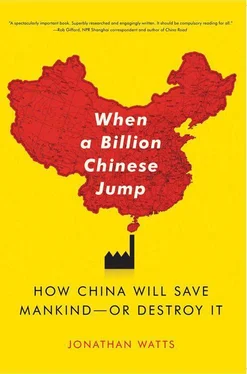The person who comes closest to providing that is probably Yu Dan, a pop philosopher whose commentary on the Analects of Confucius achieved the rare publishing feat of outselling Harry Potter. Yu, a media studies professor at Beijing Normal University, is one of the country’s hottest commentators with a pithy and approachable modern interpretation of the 2,500-year-old classics. She believes her popularity reflects a nationwide questioning of beliefs.
“We in China are trying to reset our entire value system,” she told me. “In the 1980s and 1990s, people became lost because they based their lives on money. They became greedy, destroyed the environment, plundered natural resources without restraint, and opened heavily polluting factories.”
The environment is a central concern for Yu, who considers herself more Taoist than Confucian. “To develop harmoniously, we need to follow the laws of nature. Of all the traditional Chinese beliefs, Taoism is the most reverent toward nature. Following nature is the ultimate principle.”
Yu’s eco-evangelism takes second place to her advocacy of stability and respect for order. 32In this regard, she is a model of modern Chinese political correctness. While the ancients boldly advocated “speaking truth to power,” Yu has always stuck to the party line.
The masses, she said, would only be ready for Taoism if they first understood Confucian social values: “After China develops for several more decades and becomes more materially and spiritually aware, then Taoism can become more popular, but at the moment this philosophy is too advanced.”
The idea of Taoism as a philosophy for an upwardly mobile elite is hard to reconcile with the beliefs of Yu’s professed inspiration, Zhuangzi, who idealized water because it found a way to the “low places that others disdain.” But it is very much in keeping with the plutocratic views of the modern Chinese Communist Party. Replace the word “Taoism” with “democracy” and the lines could have been scripted by President Hu Jintao. Replace it with “environmentally concerned” and the argument becomes a restatement of the canard that China will pollute first and leave the cleanup until after it is rich.
According to Yu, we had to wait patiently until a little more education and a lot more money turned today’s socially concerned Confucians into tomorrow’s eco-friendly Taoists. But it was not a case of either one or the other. One of the biggest reasons for China’s enduring success as a civilization has been the coexistence of different philosophies. It has rarely been either completely Taoist or completely Confucian. The two are emphasized to different degrees during different eras or, indeed, different times of the day. The ancient mandarins were said to be Confucian during working hours and Taoists when they went home. This flexible way of thinking allowed a constant rebalancing of ideas, like having both a governing and opposition party in the national mind.
That balance may well have been jettisoned in the modern effort to overcome national humiliation at the hands of Western industrial powers. China learned the lessons, first of Marxism and now capitalism, the hard way. Its application of both foreign ways of thinking tends to be destructively dogmatic.
This was the view of professor E Yunlong at Peking University’s new Ecocivilization Research Center. 33
“Our primary focus is on establishing a new set of values,” he said. “We must globalize our value systems … During thirty years of opening up and reform, we learned a great deal from the West. Some things, like technology, have been good, but we also picked up bad habits, such as high consumption and winner-takes-all competition. We must not let these bad habits grow, because if Chinese people want to live luxuriously, then not only China but the whole world will be unable to afford it.”
There was a nationalist bent to his argument. “It is a matter of survival,” said E. “The main aim of our center is to change the way people think. To educate people, to show them that protection of the environment is a life-or-death issue for humans … It is a matter of ethnic protection.”
A broader yet more pessimistic view was espoused by Tang Xiyang, a veteran of the green movement. Among the 300 or so people I interviewed for this book, Tang was one of very few Han to describe nature as a participant rather than a resource: “In China when people make policies, we don’t ask if nature will allow it or if nature agrees. We should. I have witnessed how China has cut down many forests. At each movement of Chinese history, the forests are the victims.”
He believed civilization was fundamentally bad for the environment and had had an increasingly adverse impact in recent centuries, not just in China but across the world: “Humans do not respect nature and history anymore. They think they can do anything they want. That is not the way to respect nature. Nature will take its revenge on mankind.”
Tang was an inspiration. I met many other brave, intelligent, and effective environmental campaigners, some of whom worked closely with the authorities such as Ma Jun, Sheri Liao, and Xie Yan, and others such as Dai Qing and Hu Jia who believed the system was the problem. They all made enormous contributions toward raising awareness of environmental issues. But Tang was the most intuitively persuasive, perhaps because he had traveled the world writing about the environment, while most of the others focused only on China. But his beliefs were as traditional as they come. Tang was fond of quoting lines from Zhuangzi:
The universe and I came into being together;
I and everything therein are one.
It is not, he said, that the ancient Taoist sages were smarter than people today, just that they lived closer to nature and understood it better. Since then, he felt, the distance has grown. “The problem is culture. We will never solve anything until we change the way we think.”
The search for a new ideal was a central theme of Wolf Totem, a bestselling novel about Han pioneers in the Mongolian grassland. The author, Jiang Rong, used his experience of life among the nomads during the Cultural Revolution as a parable for the ecological ignorance and political timidity of modern Han culture. It was one of the most influential Chinese novels of the early twenty-first century, selling more than two million copies, translated into twenty-one languages, and winning more than a dozen awards, including the Man Asian prize, the regional equivalent of the Booker. Yet it is filled with cultural self-loathing.
Far from the image of a confident, modernizing China, Jiang paints a picture of a destructive and insecure race that has neither the liberties of the West nor the natural wisdom of the Mongolian nomads. The semi-autobiographical tale is based on his own experience as a Red Guard sent to East Ujimqin Banner in Xilin Gol, Inner Mongolia, in 1967. From getting lost on the grasslands and finding himself terrified and alone among a pack of wolves to tenderly raising a young wolf cub, the events in the book are based on his life.
The protagonist, Chen Zhen, is a Han Chinese who leaves Beijing in disgust at the Cultural Revolution. He is assigned a job as a shepherd and given a ger tent among a family of Mongolian herders. He quickly grows to respect their freedom, natural wisdom, and worship of the wolf totem. By comparison, Chen feels that he is as “gutless” as a sheep:
He was saddened to have been born into a line of farmers. Farmers had become as timid as sheep after dozens, even hundreds, of generations of being raised on grains and greens, the products of farming communities; they had lost the virility of their nomadic ancestors, going back to the legendary Yellow Emperor.
Читать дальше










